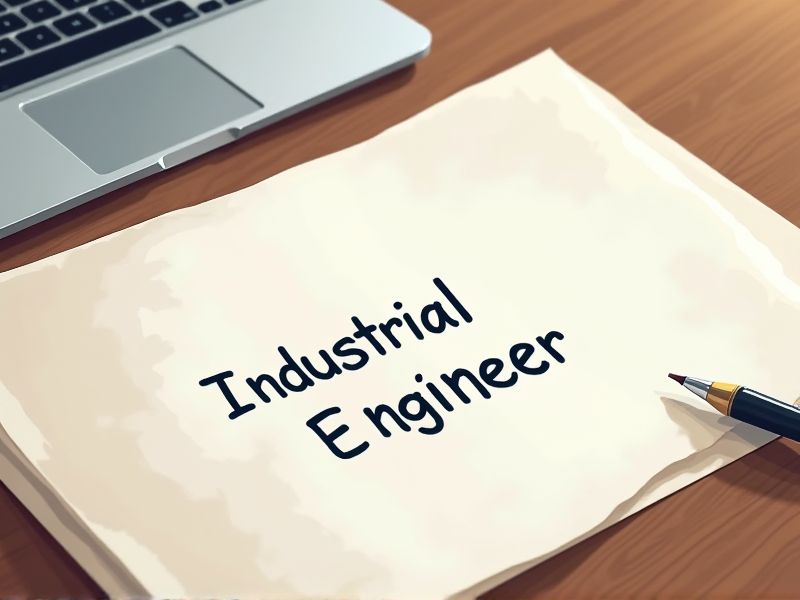
Industrial engineers often require specific certifications to validate their expertise in optimizing complex systems and processes. Certifications can enhance an industrial engineer's proficiency in areas like project management, quality control, and safety standards. Obtaining these credentials frequently leads to improved job prospects and higher credibility in the field. Here are some important certifications you may need as an industrial engineer.
Lean Six Sigma Green Belt
Lean Six Sigma Green Belt enhances an industrial engineer's ability to identify and eliminate inefficiencies, leading to reduced waste and improved productivity. Equipped with these skills, engineers can effectively manage and analyze data to drive process improvements and optimize operations. The methodology also facilitates better problem-solving and decision-making capabilities by utilizing structured approaches. Organizations often seek certified professionals to implement cost-saving measures and maintain competitive advantage in the industry.
Lean Six Sigma Black Belt
Lean Six Sigma Black Belt is needed for industrial engineers because it equips them with data-driven decision-making skills, essential for optimizing manufacturing processes. The certification enhances their ability to identify inefficiencies, leading to reduced waste and increased productivity. Mastering these methodologies empowers engineers to implement continuous improvement strategies, ensuring long-term operational excellence. Black Belt status also provides them with advanced problem-solving tools, facilitating leadership in project management and team collaboration.
Project Management Professional (PMP)
Industrial engineers often manage complex projects that require coordination among various departments; PMP certification equips them with standardized project management skills. This formal training enhances an engineer's ability to efficiently allocate resources, track progress, and mitigate risks. Earning a PMP certification can also boost an industrial engineer's credibility and career prospects by aligning their skills with industry-recognized benchmarks. The structured methodologies from PMP can lead to improved project outcomes and increased client satisfaction in industrial settings.
Certified Supply Chain Professional (CSCP)
In today's globalized market, industrial engineers with a CSCP certification can streamline supply chain operations, leading to cost reduction and increased efficiency. Acquiring CSCP credentials equips professionals with advanced knowledge in logistics management, improving their ability to coordinate complex supply networks. The certification emphasizes risk management and strategic planning, crucial for industrial engineers to adapt to market changes and disruptions. This credential distinguishes professionals in a competitive job market, enhancing career prospects and positioning them as valuable assets to their organizations.
Certified in Production and Inventory Management (CPIM)
The CPIM certification equips industrial engineers with critical insights into inventory management and production processes, which are pivotal for optimizing operational efficiency. Improved knowledge in these areas often results in reduced production costs and enhanced decision-making capabilities. As globalization intensifies competition, having a CPIM credential can differentiate professionals in the job market by validating their expertise. Understanding supply chain dynamics through CPIM can foster more accurate forecasting and leaner manufacturing operations, aligning with industry demands for minimal waste.
Certified Quality Engineer (CQE)
Certified Quality Engineer (CQE) equips industrial engineers with the skills necessary for ensuring product compliance and quality control, directly impacting product reliability. As industrial processes become more complex, the comprehensive statistical tools and techniques that CQE certification provides can significantly enhance process optimization and efficiency. Improved quality management directly correlates with reduced waste and operational cost, which positively affects a company's profitability. The industry's demand for sustainable practices emphasizes the value of certified expertise to maintain and innovate quality standards.
Certified Manufacturing Engineer (CMfgE)
Having a Certified Manufacturing Engineer (CMfgE) ensures higher competency in manufacturing processes, directly impacting production efficiency. The certification validates expertise in the latest engineering technologies, which facilitates process innovation. Industrial engineers with CMfgE credentials are often more adept at problem-solving, reducing downtime and enhancing productivity. The credential can also enhance an engineer's credibility and career prospects, attracting more opportunities in the competitive industrial sector.
Certified Professional in Engineering Management (CPEM)
Industrial Engineers often face complex managerial challenges, and the Certified Professional in Engineering Management (CPEM) credential can bridge the gap between technical skills and management expertise. Earning a CPEM enhances an engineer's ability to lead projects effectively by incorporating best management practices tailored for engineering contexts. This certification signifies a validated understanding of strategic decision-making and efficient resource allocation, which are crucial in optimizing industrial processes. Employers increasingly seek professionals with CPEM as it signals a commitment to professional growth and adherence to industry standards.
Certified Reliability Engineer (CRE)
A Certified Reliability Engineer (CRE) enhances an industrial engineer's ability to ensure product and system durability, reducing failure rates and downtime. By integrating reliability analysis, CREs improve process efficiency, leading to cost savings and resource optimization. Their expertise in risk assessment and management aids in identifying potential issues early, preventing costly disruptions. The inclusion of a CRE fosters innovation in design and production, aligning with industry standards and improving overall operational effectiveness.
OSHA Safety Certification
Industrial engineers frequently work in environments with potential hazards, and OSHA Safety Certification equips them with knowledge to mitigate these risks. This certification ensures compliance with federal safety regulations, reducing the likelihood of costly penalties for the employer. By understanding safety protocols thoroughly, industrial engineers can design systems and processes that prioritize worker safety. An enhanced safety culture, facilitated by certification, often leads to increased productivity and morale among employees.
Summary
You can expect enhanced career prospects when you, as an Industrial Engineer, acquire specific certifications. Certifications validate your expertise and make you more attractive to potential employers, leading to increased job opportunities. This additional qualification often results in higher salary potential due to the specialized skills you bring to the table. The certification process also keeps your knowledge current, aligning you with industry standards and practices.
